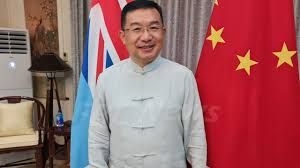China Slams U.S. Tariff Hike on Fiji as “Economic Bullying,” Urges Global Stand Against Unilateralism
FIJI NEWSWORLD


Chinese Ambassador to Fiji Zhou Jian has launched a scathing attack on the United States’ latest tariff measures, accusing Washington of “reckless economic bullying” and warning that unilateralism could drag the world into a new era of chaos and inequality.
Speaking at a press briefing in Suva, Ambassador Zhou criticized the U.S. government’s recent decision to impose punitive tariffs on a number of countries, including a staggering 32% tariff on all Fijian exports to the United States.
“This is the most reckless and destructive act of unilateral economic bullying the world has witnessed since the end of World War II,” said Zhou. “It is a disgrace that will go down in global history.”
Zhou categorically rejected claims that the U.S. is being taken advantage of in trade with China. Citing figures from the U.S. Department of Commerce and the World Trade Organization, he said both countries had gained from decades of trade, and that American companies were in fact the larger beneficiaries.
“In 2022, U.S. companies in China made over $490 billion in sales—more than six times what Chinese companies earned in the U.S.,” he noted. “China even accounts for the largest surplus in America’s service trade. This narrative of victimhood is simply false.”
The ambassador also mocked the U.S. method for calculating tariffs, describing it as “absurd.” He explained that the U.S. imposes tariffs using a crude formula based on trade deficits, rather than through internationally agreed principles. “Even penguins in Antarctica might soon face U.S. tariffs,” Zhou quipped, highlighting the global reach and irrationality of the policy.
He singled out the impact on Fiji as particularly unjust. “In 2024, Fiji’s trade surplus with the U.S. was just FJD 63 million, and 96% of U.S. goods entering Fiji face zero to five percent tariffs,” Zhou said. “Yet the U.S. responds with hostility and slaps a 32% tariff on Fiji’s exports. This directly hurts the livelihoods of ordinary Fijians.”
Zhou also warned of the broader implications of the tariff war, citing IMF and World Bank forecasts that predict a global economic slowdown as a result of the new policies. “This undermines the global trading system, destabilizes supply chains, and risks dragging us into a dark age of ‘might makes right’.”
Defending China’s decision to fight back, Zhou said Beijing has imposed its own countermeasures—raising tariffs on U.S. imports, filing cases at the WTO, and placing U.S. entities on restrictive lists. He credited China’s resistance for forcing the U.S. to suspend some of the new tariffs. “We won the world a 90-day suspension,” he said. “China’s stance is firm: we will not kneel.”
The ambassador called on countries like Fiji and others in the Global South to unite against what he described as U.S. hegemony.
“We must ask ourselves: do we choose unilateralism or multilateralism? Bullying or dialogue? The law of the jungle or international fairness?” he said. “China and Fiji must stand together to defend the multilateral trading system and promote cooperation.”
Zhou concluded by reaffirming China’s commitment to deepening its economic ties with Fiji, noting that bilateral trade reached US$534 million in 2024. He pledged further support through investment, tourism, and technology cooperation, including in agriculture and green development.
“The United States represents only 13% of global trade,” he said. “The remaining 87%—over 190 countries—hold vast potential. Strengthening China-Fiji ties is the best answer to unilateralism.”
“Vinaka vakalevu,” the ambassador concluded in Fijian, calling for a united stand for fairness, development, and global stability. Chinese Embassy in Fiji